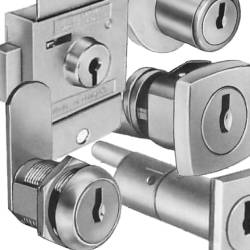What Is A Lock?
A lock is a type of door furniture and is a mechanism for providing a greater level of security protection for a point of access, whether this is in a domestic or commercial environment. Typically, the point of access will be a door, but locks can also be used on a window. Locks on doors can be both internal and external and come in many different designs and styles, depending on the level of security needed. A lock is an integral feature of an overall security system, so it is important to note that the lock itself is only as good as the door it is attached to, and the security procedures that are employed. This means that the lock will only be reliable if the door it is attached to is reliable, and the personnel or system operating the door and locks is similarly effective.
Why do we need to use locks?
Locks can form part of an access control system which can be operated in both a domestic and commercial setting. In a home, locks are used to protect us from burglary and trespass. Similarly, in a workplace locks prevent unauthorised access, but this can be both internal and external. Externally a business needs to protect its people, buildings and assets from theft, damage, trespass and arson, but it also needs to protect its intellectual property, ie. data, specifications or formulae which are unique to the business and are critical to its standing in the marketplace. Locks are integral to providing this level of protection.
Internally, there are different levels of security in a business and hence people from different departments may need to be prevented from accessing certain areas. Also, commercial businesses which are open to the public may need to prevent public access to offices, warehouses or specific employee-only areas.
What do you need from a lock?
Whatever type of lock you decide to use, there are some critical factors which the lock must possess to carry out its primary function and to provide the necessary levels of security you need. Typically you need the lock to be:
- Reliable
- Easy to use
- Uniquely accessed (ie. using a unique key, combination number or smartphone function)
- Guarantees restriction (ie. it cannot be copied, picked or hacked, and is resistant to any form of manipulation)
- Strong and robust
- Customisable so the user can reset and choose their own codes etc
What types of lock are there?
There are many different types of locks on the market, and these can be roughly categorised as being either mechanical locks or electronic locks, while some are a combination of both. A mechanical lock is engineered to lock or unlock usually using a key, while an electronic lock is locked or unlocked either using a number combination on a push button keypad or a smartphone signal. Many internal door locks are activated using an employee key fob, or a card with an electronic chip in it.
Mechanical locks range in design, sophistication and complexity, and the common types are:
- Deadbolts
- Knob bolts
- Handle bolts
- Barrel bolt and chain locks
- Padlocks
- Mortice locks
Smart locks are increasingly common because they enable a lock to be engaged or disengaged remotely, meaning they can be operated from anywhere. The user does not have to physically touch the lock, it can be opened either by touching a smartphone button, using a PIN code or using voice or video features. Smart locks can also be integrated to work with other security features, such as CCTV systems, intercom systems or emergency alerts.
When would you need to replace your locks?
As a result of there being several different types of lock on the market, this means there is always the option to upgrade your locks to a new design or system. But how do you know when is the right time? You should consider changing your locks when:
- Your locks have been broken or damaged
- There has been a security breach and the current locking system is now deemed to be insufficient or unreliable
- You have moved home or your business has moved location
- Your location is now open to a higher security risk
- Your business has changed operations or is carrying higher value materials
- There have been reports of internal security issues
- Insurance or Governmental audits have dictated that you must use a certain type of locking hardware to control a specific risk. In most cases this will demand a lock which conforms to a specific British Standard, and hence guarantees the required level of security.